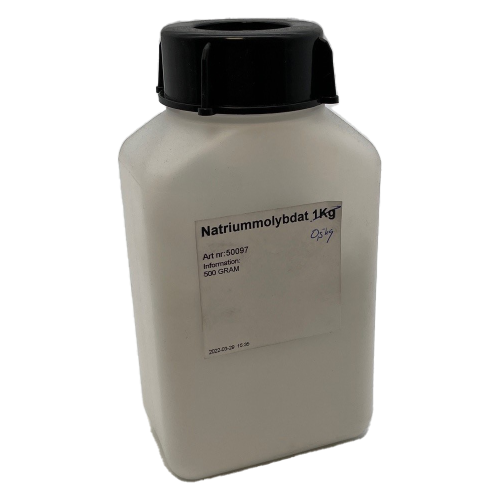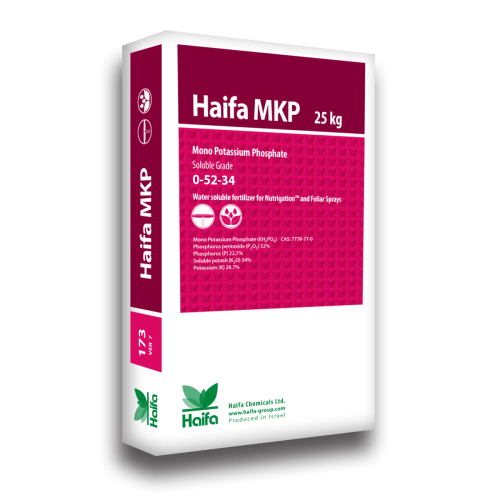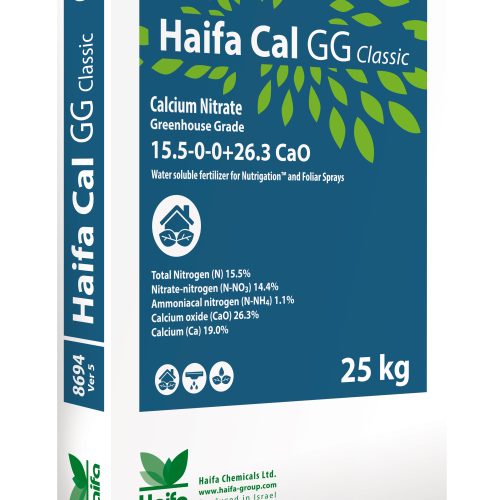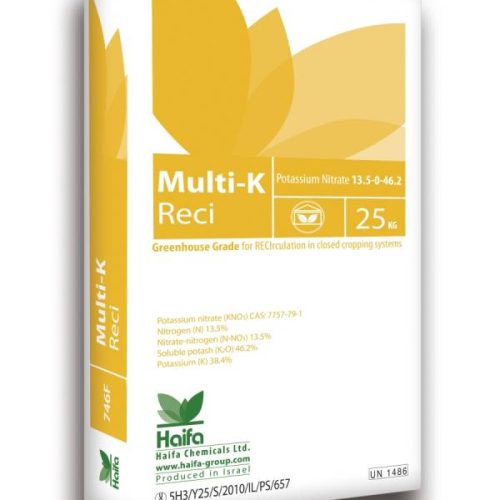-
FIELD OF APPLICATION MKP is intended for the application of phosphorus to plants by foliar fertilization and to nutrient solutions for irrigation. WHY SHOULD I USE MONOPOTASSIUM PHOSPHATE Phosphorus is an important building block as it is part of cell membranes and DNA. It is also part of the molecule ATP (adenosine triphosphate), which is needed for all energy-consuming processes in cells. As phosphorus is often difficult for plants to absorb through their roots, especially at unfavourable pH values and low temperatures, foliar fertilization is a good way to supply phosphorus. There are many varieties of phosphorus fertilizers with ammonium, potassium, magnesium or calcium to choose from. Plant sap analysis is a good tool to determine which substance besides phosphorus is most needed by the plant.
-
TECHNICAL INFORMATION
subject Content by weight %. NH4-N 12 % P 27 % Miscibility Density Dangerous goods Not with calcium and iron No, it is not. Packaging pH other 25 kg, 1200 kg/pallet 4-5 Form Unit crystalline Kg -
FIELD OF APPLICATION Magnesium sulphate is used in nutrient solutions for both irrigation and foliar fertilization to supply the plant nutrients magnesium and sulphur. WHY SHOULD I USE MAGNESIUM SULPHATE Magnesium sulphate is important for photosynthesis because the chlorophyll molecule contains magnesium. It is also used in enzymes, in protein synthesis and in cell walls. Magnesium competes with the uptake of calcium and should therefore not be supplied in excessive amounts, especially to plant species susceptible to physiogenic diseases caused by calcium deficiency. Examples are pistil rot in tomatoes, leaf scorch in lettuce and spotted wilt in apples. Sulphur is a component of certain amino acids and is therefore essential for the plant's ability to produce protein. Sulphur is also involved, for example, in fat production and in energy transfer reactions in cells.
-
FIELD OF APPLICATION Haifa Cal is used for the supply of nitrogen and calcium in nutrient solutions to all plant species both by watering and foliar fertilization. WHY SHOULD I USE HAIFA CAL Calcium nitrate provides calcium which is important for the quality of fruits and improves shelf life. Calcium is incorporated into both cell membranes and cell walls and is important for cell stability and disease resistance. Nitrogen is the plant nutrient most needed by the plant, as it is incorporated into DNA, chlorophyll and all the amino acids needed by the plant for protein synthesis and enzymes that have many functions in the plant. Nitrogen is available in different forms, calcium nitrate contains a small amount of ammonium which helps to counteract unwanted pH increase in the substrate. But nitrogen should not be overdosed. Consider the possibility of replacing part of the calcium nitrate with calcium chloride to give better taste and quality. Used mainly in tomato cultivation. Caution is recommended in other cultures.
-
FIELD OF APPLICATION Potassium Sulphate Haifa SOP Bio is used in nutrient solutions for both irrigation and foliar fertilization to supply the plant nutrients potassium and sulphur. When nitrogen supply needs to be limited, such as during flowering, fruiting and at the end of the growing season, potassium sulphate is an excellent nitrogen-free source of potassium. It also provides valuable sulphur to the crop. WHY SHOULD I USE POTASSIUM SULFATE SOP BIO Potassium improves the plant's tolerance to drought, frost, pests and thus increases yields. The ability to control the potassium/nitrogen ratio also provides the conditions for a better quality, shelf life and higher sugar content in the plant. Sulphur is a component of certain amino acids and is therefore crucial to the plant's ability to produce protein. Sulphur is also involved, for example, in fat production and in energy transfer reactions in cells. The sulphur content of potassium sulphate makes it particularly suitable for crops such as cabbages, onions, sunflowers and others, as they produce sulphur-rich organic compounds as protective substances.
-
FIELD OF APPLICATION Multi-K Reci is used in nutrient solutions and is suitable for all crops receiving nutrient irrigation. Can also be used for foliar fertilization. Potassium nitrate contributes to better flowering and fruit development thanks to its high potassium content. The combination of potassium and nitrate results in rapid uptake by the roots. Nitrogen is the plant nutrient most needed by the plant, as it is incorporated into DNA, chlorophyll and amino acids, as well as into enzymes that have many functions in the plant.
-
FIELD OF APPLICATION Potassium chloride is used in nutrient solutions to supply the plant nutrients potassium and chloride. When nitrogen supply needs to be limited, e.g. at flowering, fruiting and at the end of the growing season, potassium chloride can be used in tomato cultivation to add chloride and increase the potassium content without affecting the nitrogen supply. Chloride is now considered to benefit both the generative growth of tomato plants and the taste of the fruit. WHY SHOULD I USE POTASSIUM CHLORIDE Potassium improves the plant's tolerance to drought, frost, pests and thus increases yields. The ability to control the potassium/nitrogen ratio also allows for a better quality, shelf life and higher sugar content of the plant. Chloride is sometimes considered a micronutrient, but in most crops it does not need to be added as sufficient levels are present in soil and water. In tomato cultivation, it should be added for flavor and for growth management.











